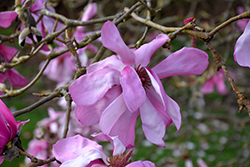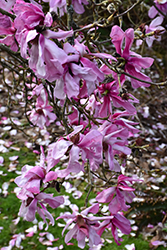It's all about ...
plants

Eric Savill Sprenger's Magnolia
Magnolia sprengeri 'Eric Savill'
Height: 30 feet
Spread: 20 feet
Sunlight:
![]()
![]()
Hardiness Zone: 6a
Other Names: Magnolia sprengeri var. diva 'Eric Savill'
Description:
A breathtaking tree, featuring large, cup shaped, rich rose-pink flowers in early spring, that have a wonderful fragrance; neat foliage and an upright, oval habit of growth; flowers late, to avoid most frosts
Ornamental Features
Eric Savill Sprenger's Magnolia is clothed in stunning fragrant rose cup-shaped flowers with hot pink overtones at the ends of the branches from early to mid spring before the leaves. It has dark green foliage with grayish green undersides which emerges light green in spring. The large oval leaves turn yellow and in fall.
Landscape Attributes
Eric Savill Sprenger's Magnolia is a deciduous tree with a shapely oval form. Its relatively coarse texture can be used to stand it apart from other landscape plants with finer foliage.
This is a relatively low maintenance tree, and should only be pruned after flowering to avoid removing any of the current season's flowers. Deer don't particularly care for this plant and will usually leave it alone in favor of tastier treats. It has no significant negative characteristics.
Eric Savill Sprenger's Magnolia is recommended for the following landscape applications;
- Accent
Planting & Growing
Eric Savill Sprenger's Magnolia will grow to be about 30 feet tall at maturity, with a spread of 20 feet. It has a low canopy with a typical clearance of 3 feet from the ground, and should not be planted underneath power lines. It grows at a medium rate, and under ideal conditions can be expected to live for 80 years or more.
This tree does best in full sun to partial shade. It requires an evenly moist well-drained soil for optimal growth, but will die in standing water. It is not particular as to soil type, but has a definite preference for acidic soils. It is quite intolerant of urban pollution, therefore inner city or urban streetside plantings are best avoided. Consider applying a thick mulch around the root zone in winter to protect it in exposed locations or colder microclimates. This is a selected variety of a species not originally from North America.
This plant is not reliably hardy in our region, and certain restrictions may apply; contact the store for more information.

